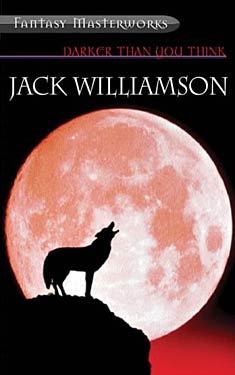Jack Williamson
Completed 6/26/2014, Reviewed 6/26/2014
4 stars
I selected this book for the Grand Master, Masterworks, and
Fantasia Challenges. I knew nothing
about this book or Jack Williamson. I
had some concern because one of the sub-genre tags is Werewolves. Call it prejudice, but I only think of
werewolves in the context of B-movies and of course the recent vampire/werewolf
romance craze. So I wasn’t expecting too
much.
 The book begins with a low-budget black and white horror
feel. A reporter meets a mysterious
woman at an airport while waiting for a press conference at the arrival of a a
professor and his research team’s plane from
The book begins with a low-budget black and white horror
feel. A reporter meets a mysterious
woman at an airport while waiting for a press conference at the arrival of a a
professor and his research team’s plane from
I couldn’t believe the melodrama of this scene. The foreshadowing was uncomfortably obvious. The soapy sudden death right before the big announcement
was almost laughable. I thought I was in
for 282 pages of sheer torture. The story
continues with Will Barbee, the reporter, making a possible link between April
Bell, the mysterious woman and the professor’s death. They have drinks and dinner complete with
clunky dialogue. April confesses to
being a witch. That night, Barbee has dream
about turning into a wolf. Somewhere
around that point, the book grabbed me.
The basic plot is very simple and formulaic. The characters are two-dimensional. You see everything coming. But I found Barbee’s nightly excursions in the
transformed state mesmerizing. It makes
the scenes which take place during the day more riveting. I found myself consuming the book despite
feeling like I was in a 50’s black and white creature feature movie.
An interesting part of the story is that Williamson attempts
to add some science into the werewolf/witch mythology. I found it quite fun, although he brings up a
lot of science that is now outdated. For
instance, he places the origin of Homo Sapiens in the Gobi
Desert rather than in Africa . He has his
characters involved with ancient strict Freudian psychology. And when he discusses a germ theory, all I
could think about was commercials from the 70s for Listerine and Lysol. But I enjoyed the attempt and quickly found myself
willingly suspending disbelief.
One thing I like about early the early SF writers,
particularly in their short stories, is their regular use of the twist at the
end. It’s one of the reasons I love
Bradbury’s short stories, and of course, “The Twilight Zone.” “Darker” has a neat little twist at the end. It’s not a shocker, but it adds another layer
of fun to the experience.
When I began the book, I was sure I was going to give it two
out of five stars. Instead, I give it
four stars, not because it’s great literature, but because it’s a fun excursion
into the earlier days of SF, Fantasy, and Horror that some of us older folks enjoyed
as kids on Saturday nights in front of our gigantic twelve-inch black and white
television set.
No comments:
Post a Comment